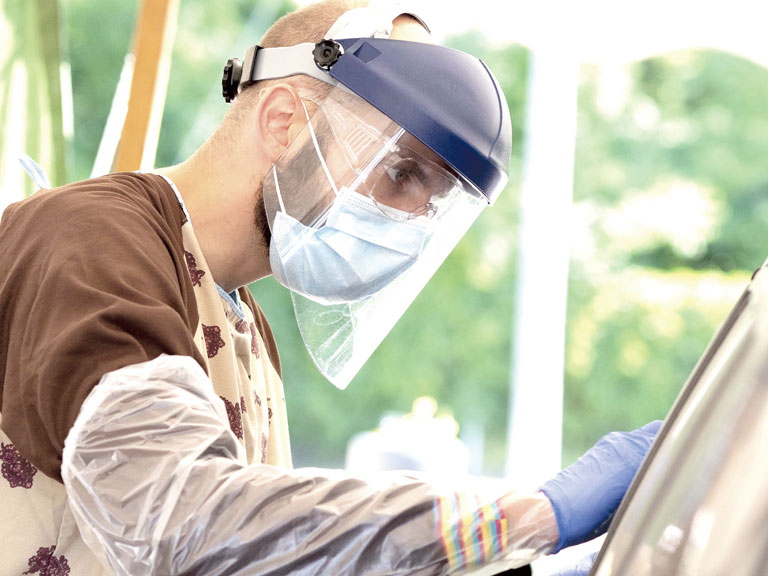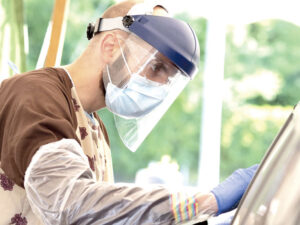County News
Working on the front line

Family Health Team continues to serve the community
The Prince Edward Family Health Team (PEFHT) has been at the forefront in terms of protecting the community from the spread of COVID-19, as well as continuing to serve the health needs of County residents through this time unlike any witnessed in generations. The PEFHT has had to adapt to rapidly changing conditions, and has had to find innovative ways to maintain their compassionate health care for the community. From drive-through testing for the SARS-CoV-2 virus, to home visits to those residents too frail to make the trip to their doctor’s office, the team has continued on in the face of this ongoing pandemic. And the community has expressed its gratitude—and continues to do so—with letters of support, message boards on front lawns or in windows, and by donating home-made masks and gowns to health care workers across the County.

Dr. James Burrows administers a test for COVID-19 at the drive-through assessment centre in Picton.
Dr. James Burrows has been working at the COVID-19 assessment centre in Picton since it opened in April. At first, the centre only tested residents who were exhibiting symptoms of COVID-19, but now it is open to anyone who wishes to have the test done. The test itself takes approximately ten seconds to administer, of which Dr. Burrows says only the first two seconds is “a little unpleasant”. But there is far more involved in a visit to the assessment centre. There are questions to be answered, and protocols to be followed. For someone not exhibiting symptoms, the test typically takes about five to10 minutes. In other cases, though, the attending physician may decide that a more thorough examination is warranted, which may include checks for temperature, blood oxygen level, and blood pressure. With an average of about 50 tests done each weekday, it’s a full day of work. “Medicine is different now, especially in the context of working in the assessment centre, and it’s been a learning curve, but with the support of other docs at the PEFHT, especially Doctors Sarah LeBlanc and Elizabeth Christie, who have done a lot of work setting up the centre, it’s been a pretty smooth transition to this new way of life,” said Dr. Burrows. “Of course it can be very stressful. In the beginning when we really didn’t know what to expect, when all this was very new, it was more stressful, but we’re familiar now with how things work and we have good protective equipment, and that makes a big difference in helping us feel safe at work. One of the challenging things about COVID is that it has such a broad range of symptoms. Our process, in terms of medically what we have to do, is all laid out for us. Sometimes people are nervous or worried, and part of what we do is talking about that and counselling them.” He said that the level of community support has been outstanding. “The messages that we’ve seen on signboards and windows are a nice reminder that we are all in this together, and we’re all supporting each other through this. People are respecting social distancing and so many locals are wearing masks, being careful and following isolation procedures. There’s a great community feeling in Prince Edward County, and I’m not surprised to see that continuing to shine through in these strange times.”
One of the community groups that has responded to the needs of health care workers in the County Sewers. What started as a request by Dr. Kristin Morrison for someone to make cloth face masks grew into a group of about 65 people across the County.
Some of these people procured the material, others washed it, still others cut the material according to a pattern and distributed it to the sewers who eventually made 1,730 face masks, 390 gowns and 48 scrub caps. Laura Nelson was one of the organizers of the group, and while she is not a sewer, she took on the role of coordinator and delivered the items to where it was needed, such as the assessment centre, the hospital emergency department, Hospice Prince Edward and long-term care facilities. “I just want to say how proud everyone is, and many of them have said it’s helped them get through the pandemic having a focus and being able to help County nurses and doctors and the residents. We were so glad to be able to help,” she said. The assessment centre is a good example of why so many gowns were needed—to prevent crosscontamination, the doctor on duty takes off all of his or her personal protective equipment when entering the adjacent community centre, and puts on a new set when coming back out to continue assessments, something that happens frequently during the day.
The PEFHT has had to find new ways to provide health care to County residents who may not be able to make regular visits to their doctors. Brad Gunn is a nurse practitioner and has been with PEFHT for about eight years. He provides palliative care in the community by assisting patients who are dying either by transitioning to hospice, or maintaining at home. He also provides care to patients who are too frail to visit their family physician. “Early on in the pandemic it was much more phone consults and keeping the home visits to a minimum,” he said. “There is inherent additional stress because of the pandemic; we’re used to protecting ourselves against viruses in the field that we work in, but the main thing we are doing is trying to be as up to date on information as it comes out with regards to cases and prevalence in the community, and following guidelines for personal protective equipment, protecting ourselves and anyone we come in contact with. There’s a good level of support for the work that we do. You can see it in the patients who are understanding of us doing a phone visit versus a home visit. You see how families come together to support these vulnerable people who are at home. You see it in the community volunteers who make PPE for us so that we are able to perform our jobs and feel safe. Also, we have a team that is very supportive. There’s not enough good that can be said about the teamwork for the Family Health Team.”
Johanna Leonhardt has been getting a first-hand look at how the PEFHT operates. She is a student nurse practitioner studying at Queen’s in Kingston and has been accompanying PEHFT members as part of her training. “My experience so far has been absolutely fantastic. I’m really grateful that we have been able to continue on with our education at Queen’s,” she said. “I get the experience of being with the Family Health Team, but also get experience in how to manage myself and how to help my patients keep up to date with the virus, and I think that’s a very valuable experience to have.”

Comments (0)